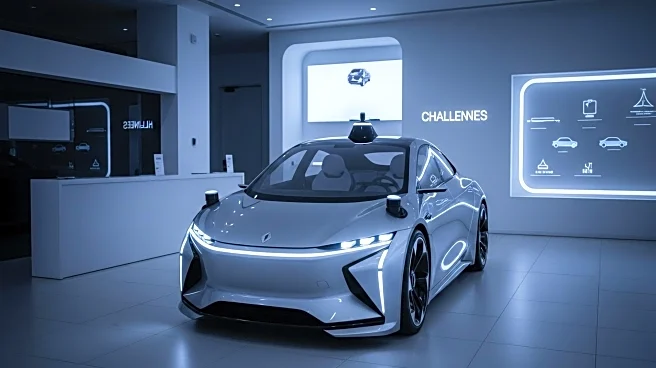What's Happening?
Nissan is advancing its self-driving technology as part of efforts to revitalize its struggling auto business. The company recently demonstrated a Nissan Ariya sedan equipped with 11 cameras, five radars, and LiDAR sensors navigating through Tokyo. This technology, developed in collaboration with British company Wayve, is expected to be available by 2027. The self-driving car market is projected to reach $2 trillion by 2030, driven by advancements in AI and sensor technologies. Nissan's initiative comes amid challenges in the Japanese auto market, exacerbated by tariffs imposed by President Trump. The company has faced financial losses and has appointed Ivan Espinosa as the new chief executive to lead a turnaround.
Why It's Important?
Nissan's development of self-driving technology is crucial for its survival and competitiveness in the rapidly evolving automotive industry. The move positions Nissan alongside other major automakers like Toyota, Honda, and General Motors, who are also investing in autonomous driving technologies. The potential $2 trillion market for self-driving cars by 2030 highlights the significant economic opportunities for companies that successfully innovate in this space. However, Nissan's efforts are set against a backdrop of economic challenges, including tariffs that impact the Japanese auto market. Success in this venture could help Nissan recover from recent financial setbacks and strengthen its position in the global market.
What's Next?
Nissan plans to release its self-driving technology by 2027, although specific models and details have not been disclosed. The company will likely continue to refine its technology and collaborate with partners like Wayve to ensure successful implementation. As the technology progresses, Nissan may face competition from other automakers and tech companies like Amazon and Zoox, who are also developing autonomous driving solutions. The broader industry will be watching Nissan's progress closely, as successful deployment could influence market dynamics and consumer adoption of self-driving vehicles.
Beyond the Headlines
The development of self-driving technology raises ethical and legal questions regarding safety, liability, and regulatory standards. As autonomous vehicles become more prevalent, policymakers will need to address these issues to ensure public safety and trust. Additionally, the shift towards self-driving cars could have long-term implications for employment in the transportation sector, as traditional driving roles may diminish.










